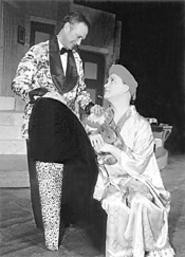Imagine, if you're able, a high-end drag nightclub in France owned and operated by Attorney General John Ashcroft. First of all, he'd allow no wussy French words or accents. (Even backstage signs are written in English. To hell with French drag; let's call it freedom drag!) He'd make the girly-boys' costumes dowdy and sad. And he'd want the drag performers to obviously look like men in dresses, since any hint of gender confusion would be morally suspect.
As ghastly as that idea sounds, it has been captured perfectly in Beck Center's rendition of the frothy musical La Cage aux Folles. Responsibility for this uneven production must be handed to veteran Cleveland-area director Fred Sternfeld, who may have decided to herd a bunch of his bad decisions into one play and be rid of them for all time.
One can only hope that's the case. Otherwise it's hard to justify his casting of what is surely the most femininity-challenged drag chorus to ever strap on sock-stuffed bras. In brief, these under-made-up, overly muscled fellows can't dance, can't sing, and seem slightly put out about being asked to behave in girlish ways. As always, a couple of real girls are sprinkled into the dance line, but one is so petite and such a good dancer, she makes the boys look like ill-trained manatees. Thus, the entrancing illusion of a female impersonator show (You mean that's a boy?) is replaced with matter-of-fact observation (Yep, that's a boy). Granted, it must be difficult to find actors who can approximate the impersonations of seasoned drag queens. But if you can't, then forget about doing La Cage; put on Twelve Angry Men and be done with it.
The play itself, with music and lyrics by Jerry Herman and book by Harvey Fierstein, has been delighting audiences since 1983 with the usually surefire combination of boys in dresses, some serviceable tunes, and a shrink-wrapped, vacuum-sealed message of family acceptance and societal tolerance. A gay couple, sturdily fey Georges and flamboyantly swishy Albin, own the Saint-Tropez drag club La Cage aux Folles. Georges is the master of ceremonies, while Albin is the diva, Zaza. They have a grown son, Jean-Michel -- conceived during a one-time fling between Georges and a showgirl -- who has returned to marry the daughter of the bigoted, puritanical politician Edouard Dindon. When the Dindons come to visit, chaos ensues, as Georges and Albin try to pass as straights so that their boy can marry the girl of his dreams.
To make this material ignite, you must have a kick-ass Albin, since he is the emotional centerpiece -- a juicy character that allows a performer to screech, flail, and camp it up without ever being accused of overacting. Kevin Joseph Kelly, a gifted comic actor, is adept at times, but often seems cut adrift in this role. There is a visual disconnect, since his curly Wal-Mart wigs give off the vibe of a novice cross-dresser. Where are the elegant, imaginative 'dos that a drag queen of Albin's eminence would wear? Kelly grapples gamely with this and other external obstacles, but never seems truly invested in Albin's femme-centric persona. In his scenes with Georges, whether he's being bitchy or tender, Kelly doesn't master the intimate byplay that would be natural between such longtime partners. And as Zaza, Kelly shows off his consummate timing, but lacks the edgily seductive, sassy-smart style that is the lifeblood of drag headliners.
The less demanding roles are handled capably. Greg Violand's Georges is a supremely confident MC with a rich singing voice, hitting the right mix of tenderness and sophistication. Brian Etchell sings enchantingly as Jean-Michel, but his dialogue scenes are labored. As the flaming butler/ maid Jacob, Howard Pippin has a couple of comically inspired moments, separated by lots of running and banging through doors. And G.A. Taggett is stout and snarly as the prude Dindon, making his re-costumed emergence at the end of the play a hoot.
Beck has devoted substantial sums to mounting this demanding production, and some of those funds could have been spent more wisely. The heavy upholstery-fabric drag costumes designed by Alison Hernan and Jeffrey M. Smart are understandable (anything to keep these clods from moving), but have feathers and sequins been banned in Lakewood, of all places? And the set design of Georges and Albin's apartment, which is supposed to be brazenly homosexual, is about as middlebrow (even with the high-heel chair) as the Golden Girls living room.
Perhaps the most disappointing moment is the presentation of Albin's keynote song, "I Am What I Am." This powerful and proud composition, the anthem of outcasts everywhere, should be a guaranteed showstopper. However, due to this production's absence of illusion, the tune seems more like a petulant whine than a cri de coeur. (Pardon my French, Mr. Ashcroft; I meant "freedom cry.")


